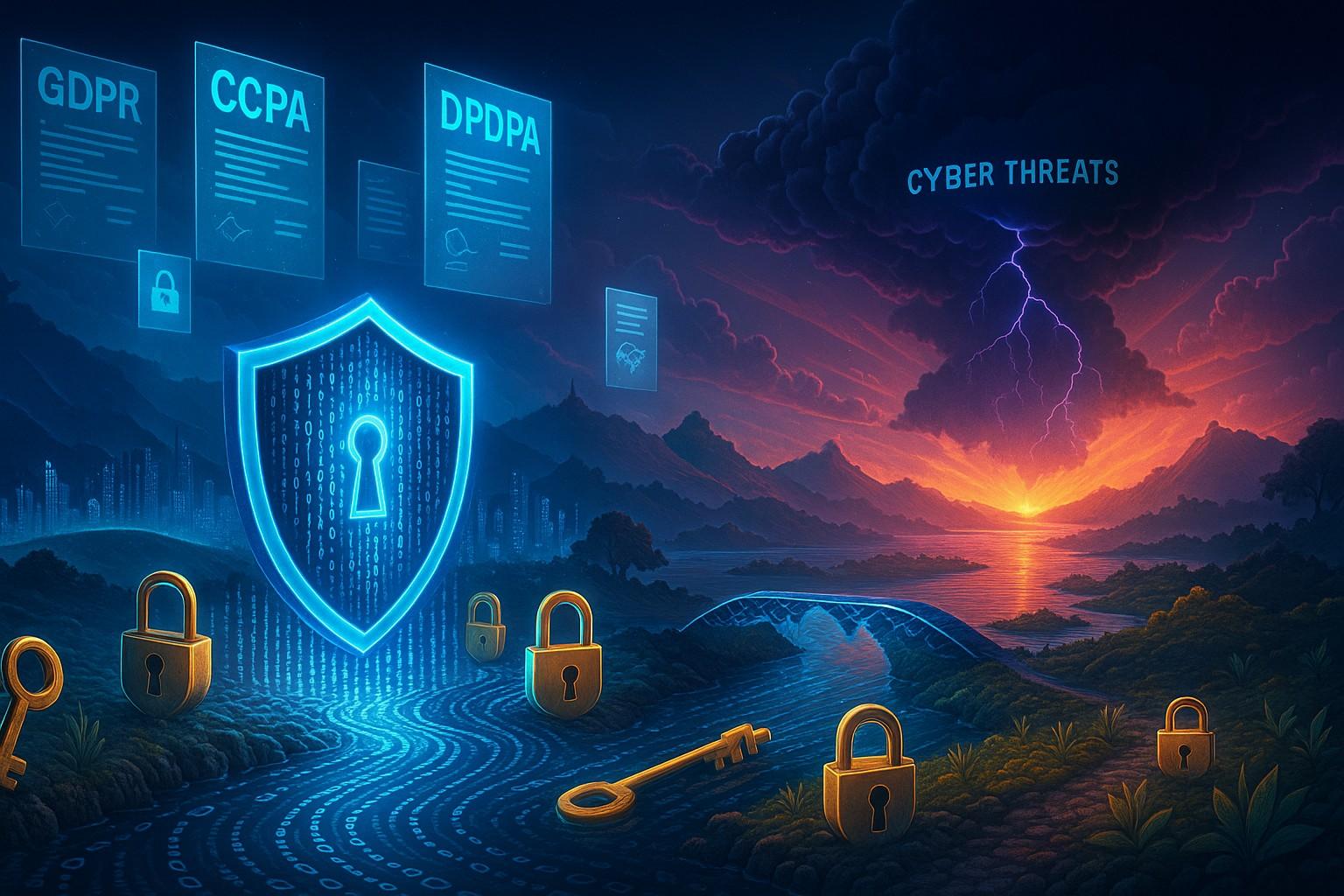In the digital age, data has become a critical asset, powering economies, guiding policy, and shaping human connections. However, the exponential growth of data compilation, processing, and storage has exposed societies to unparalleled risks, chiefly concerning privacy violations and cyber security threats. This paper explores the many-sided legal challenges that have emerged in response to the growing significance of data and the evolving threat landscape. Key issues include the jurisdictional limitations of national laws, the inconsistency in global data defense regulations, the rise of surveillance capitalism, the impact of artificial intelligence, and the enforcement difficulties faced by regulatory bodies. The paper also evaluates major legal frameworks such as the General Data Protection Regulation (GDPR), the California Consumer Privacy Act (CCPA), and sector-specific legislation.
It further discusses challenges posed by cybercrime, data breaches, and the accountability of corporations and governments in protecting personal information. With the increase in transnational data flows and cyber incidents, the need for harmonized legal standards and global cooperation is more critical than ever. The article concludes by recommend legal reforms that focus on transparency, accountability, and technological adaptability. These reforms are essential to uphold data rights and maintain trust in the digital ecosystem.
Keywords: Data Privacy, Cyber Security, Legal Challenges, Cyber Crimes, GDPR, Puttswamy Case, Digital Rights, Information Technology Act.
1. Introduction
The digital revolution has fundamentally transformed how individuals, corporations, and governments generate, store, and utilizes data. With the ubiquity of smart devices, cloud computing, and Internet of Things (IoT) technologies, personal data is continuously being harvested and analyzed. While this has led to innovation and convenience, it has also created complex legal challenges related to data privacy and cyber security. The legal system, traditionally reactive and jurisdiction-bound, struggles to address the dynamic and borderless nature of digital threats. This paper seeks to dissect the primary legal challenges of the modern digital age and propose solutions that align with both civil liberties and the stress of cyber security.
2. The Rise of Data as an Asset and a Liability
A. Data as the New Oil
Data is often compare to oil for its economic value and potential for exploitation. Unlike oil, however, data is non-rivalries and replicable, making it more vulnerable to misuse. Corporation monetize user behavior, preferences, and even biometrics, often with minimal user awareness. Legal challenges arise in determining data ownership, usage rights, and obligations for data controllers and processors.
B. The Dilemma of Consent
Most data protection frameworks rely on user consent as a cornerstone principle. However, in practice, consent is frequently obtained through lengthy terms and conditions that few users read or understand. The legal validity of such consent is dubious, in particular when power imbalance and lack of alternative are present.
3. Major Legal Frameworks and Their Limitations
A. General Data Protection Regulation (GDPR)
The GDPR represents a comprehensive approach to data privacy in the European Union. It mandates lawful data dispensation, requires clear consent, grants individuals rights such as access and erasure, and imposes strict breach announcement rules. Despite its broad scope, the GDPR faces enforcement challenges, especially against tech giants with global operations.
B. California Consumer Privacy Act (CCPA)
The CCPA is a landmark U.S. law providing California residents with rights to know, delete, and opt-out of the sale of personal information. While it offers more lucidity than previous U.S. laws, it lacks the rigor and answerability mechanisms of the GDPR and applies only to specific business sizes and types.
C. Global Fragmentation
One of the most significant challenges is the lack of harmonization in data protection laws. Countries such as China, India, Brazil, and the U.S. have adopted divergent models, creating compliance burdens for multinational corporations. The absence of a unified international standard leads to forum shopping, legal loopholes, and conflicts of law.
4. Cyber security Threats and Legal Responses
A. Evolving Threat Landscape
Cyber threats have grown in complexity, with ransom ware, phishing, and nation-state cyber-attacks becoming commonplace. The legal system struggles to keep pace, particularly in identifying perpetrators, attributing attacks, and determining jurisdiction.
B. Data Breaches and Liability
High-profile data breaches involving companies like Equifax, Marriott, and Face book have prompted legal actions and narrow scrutiny. However, proving negligence and establishing liability in court remains difficult. Most legal remedies are reactive, focusing on compensation after harm has occurred, rather than preventive regulation.
C. The Role of International Law
Cybercrime transcends borders, yet global law remains badly equipped to address these challenges. Existing treaties, like the Budapest Convention on Cybercrime, are not universally adopted, and worldwide cooperation is often hindered by following tensions.
5. Surveillance, AI, and Ethical Concerns
A Government Surveillance
Post-9/11 security policies expanded government surveillance capability, often at the expense of privacy rights. Programs like PRISM in the U.S. and similar efforts globally have sparked debates about legality, oversight, and proportionality.
B. Artificial Intelligence and Predictive Policing
AI systems increasingly use personal data to predict behavior, including criminal tendencies. Legal frameworks lag behind, offering limited guidance on bias mitigation, transparency, or accountability in algorithmic decision-making.
C. Ethical Implications
Legal systems face the challenge of embedding ethical principles into laws governing data usage. Issues include discrimination, manipulation through targeted advertising, and the erosion of autonomy. The current laws seldom address the deeper philosophical implications of mass data collection.
6. Corporate Accountability and Compliance Challenges
A. Big Tech and Market Dominance
Companies like Google, Amazon, Meta, and Apple wield significant control over data ecosystem. Legal frameworks must address not only privacy violations but also the anticompetitive behaviors tied to data monopoly. The Digital Markets Act in the EU is one such attempt to restore balance.
B. Compliance and Enforcement
Even where laws exist, enforcement is often conflicting. Regulatory bodies may lack resources, expertise, or political will. Moreover, companies exploit ambiguities in the law, often opting to pay fines rather than overhaul their business models.
7. Legal Innovations and Future Directions
A. Privacy by Design and Default
Laws increasingly mandate that privacy consideration be embedded into systems from the outset. This approach requires interdisciplinary teamwork between engineers, legal experts, and ethicists. However, its completion remains not in agreement.
B. Data Fiduciaries and Stewardship
Some scholars advocate for the concept of data fiduciaries—entities legally bound to act in the best interests of data subjects. This model could talk to power imbalances and improve accountability but would require important legal reform.
C. Cross-border Data Governance
There is growing momentum toward global frameworks that regulate cross-border data flows and security obligations. Initiatives like the OECD Privacy Guidelines and efforts by the UN and G20 could provide a foundation for global consensus.
8. Case Law: Schemes II (2020)
One of the most powerful cases in the domain of data privacy is the European Court of Justice (ECJ) ruling in Data Protection Commissioner v Facebook Ireland Ltd and Maximillian Schemes—popularly known as Schemes II.
Background:
Maximillian Schemes, an Austrian privacy activist, challenged the validity of the EU-U.S. Privacy Shield, a framework that allowed data transfers between the two regions. He argued that U.S. surveillance laws did not provide adequate protection for EU citizens’ data. Court’s Findings: The ECJ invalidated the Privacy Shield, stating that U.S. laws failed to guarantee privacy rights equivalent to those in the EU. However, the court upheld Standard Contractual Clauses (SCCs) as a valid mechanism, provided additional safeguards are in place.
Implications: Increased compliance obligations for multinational companies.
- Greater emphasis on data impact assessments before cross-border transfers.
- Highlighted the need for a harmonized international data transfer framework.
Legal Lessons: This case illustrates the tension between national security laws and individual privacy rights and underscores the importance of robust legal mechanisms for international data transfers.
8. Recommendations
- Harmonize Global Standards: A concerted effort is needed to align national laws with universal principles of data protection and cyber security.
- Strengthen Regulatory Enforcement: Provide agencies with adequate funding, training, and self-government to hold violators accountable.
- Promote Technological Literacy: Educate the public and stakeholders about data rights, privacy tools, and the implications of digital choices.
- Mandate Algorithmic Transparency: Legal reforms should include audits, explain ability requirements, and redress mechanisms for AI-driven decisions.
- Support Victims of Cybercrime: Develop legal aid frameworks and compensation funds for individuals and small businesses affected by data breaches.
9. Conclusion
The interplay between data privacy and cyber security represents one of the most pressing legal challenge of our time. While technical progression is inevitable and desirable, it must not come at the cost of primary rights. Laws must evolve to reflect the digital reality and offer robust protection against misuse. The journey toward a secure and privacy-respecting digital ecosystem requires two-way efforts by governments, corporations, legal systems, and civil society alike.
10. References
- Justice K.S. Puttaswamy (Retd.) v. Union of India, (2017) 10 SCC 1.
- General Data Protection Regulation (GDPR), European Union, 2018.
- Digital Personal Data Protection Act, 2023, Government of India.
- Information Technology Act, 2000, Government of India.
- California Consumer Privacy Act (CCPA), 2018.
- Solove, Daniel J., Understanding Privacy, Harvard University Press, 2008.
- Schneier, Bruce. Data and Goliath: The Hidden Battles to Collect Your Data and Control Your World, Norton, 2015.
- Warren, S., & Brandeis, L. (1890). “The Right to Privacy,” Harvard Law Review, 4(5), 193–220.
– Dr. Meenu D. Sharma, Assistant Professor
Faculty of Law, Madhav University

